Navigate the divine intricacies of Biblical creation stories, where each day unveils a universe crafted by God's command—discover what happens next.
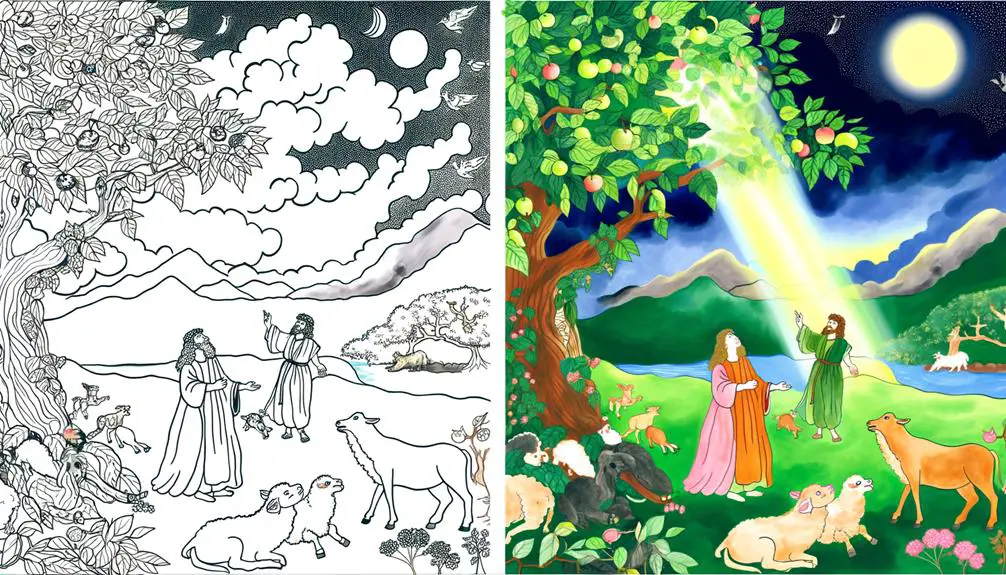
Creation Stories in the Bible
In the Bible, the creation stories, mainly found in Genesis, articulate a divinely orchestrated sequence of events where each day fulfills a specific divine purpose. You'll see that light, darkness, and life emerge meticulously, highlighting God's sovereignty and the establishment of a harmonious universe. While Moses is traditionally credited as the author, modern scholarship often debates this point, viewing the text as a product of collective divine inspiration. This scholarly dialogue not only enriches the understanding of Genesis's text but also invites you to explore deeper layers of meaning in these narratives, revealing their profound impact on moral and ethical paradigms.
Key Takeaways
- The Bible's creation stories begin with the seven days of creation, detailing God's methodical formation of the universe and life on Earth.
- Adam and Eve's narrative in the Garden of Eden explores themes of innocence, disobedience, and the consequences of human actions.
- Symbolic elements like the Tree of Life and various fruit trees in Eden highlight themes of eternal life, divine grace, and God's generosity.
- These stories underscore the importance of free will, moral choices, and their implications for humanity's relationship with God.
- The creation narratives have profoundly influenced cultural, ethical, and religious perspectives globally, shaping art, law, and interfaith dialogue.
Genesis and Its Beginnings
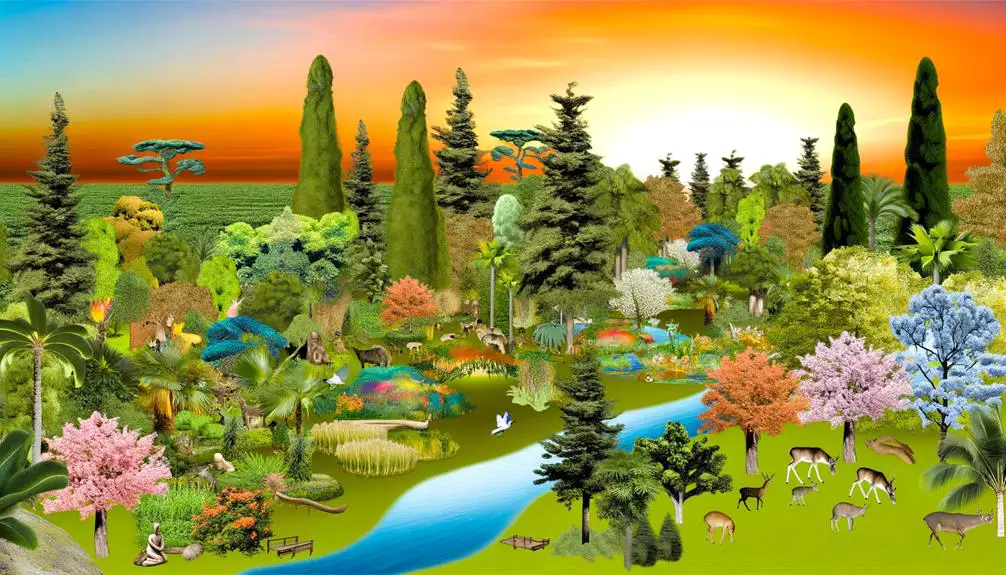
In the book of Genesis, you'll find that creation unfolds through a divinely orchestrated sequence, illustrating God's omnipotence and purposeful design. This foundational text, often surrounded by authorship debates, isn't merely an ancient manuscript; it's perceived as a product of divine inspiration, guiding its narrative and theological underpinnings.
You might wonder about the debates surrounding who actually wrote Genesis. Traditionally, Moses has been attributed as the author, but modern scholarship frequently questions this, suggesting that multiple sources could have contributed to its composition. This discourse isn't just significant—it affects how the text is interpreted and understood in a faith-based context.
The concept of divine inspiration plays an important role here. If you accept that Genesis was inspired by God, then the message and the lessons therein carry a weight of divine authority, regardless of human authorship. This perspective helps bridge the gap between differing viewpoints by emphasizing the spiritual rather than the literal historical accuracy.
Understanding these elements is essential. It allows you to see Genesis not just as a story of origins but as a complex interplay of divine message and human agency, crafted to convey eternal truths through the lens of temporal narratives.
The Days of Creation
As you explore the Days of Creation, you'll find that each day serves a distinct purpose, reflecting God's order and mastery. The division of light from darkness sets a cosmic stage, while the emergence of life on subsequent days highlights the interplay of divine command and natural order. Finally, the rest on the seventh day isn't merely cessation but a sanctification of time itself, inviting you to contemplate its spiritual significance.
Light and Darkness Division
On the first day of creation, God commanded, 'Let there be light,' thereby dividing light from darkness in a pivotal act of cosmic differentiation. This moment is pivotal in understanding the Biblical view of the universe's structured nature. You see, the division of light from darkness lays the groundwork for all subsequent acts of creation. It's a clear manifestation of cosmic dualism, where opposing forces are seen as integral to the harmony of existence. Philosophical interpretations often explore how this separation symbolizes moral and spiritual dichotomies inherent in human experience. By initiating creation with this separation, the narrative sets a tone of order and purpose, suggesting that balance and conflict are embedded in the very fabric of the cosmos.
Life Emerges on Earth
Exploring the division of light from darkness, God's command further shaped the cosmos by calling forth life on Earth through a series of creative acts detailed across the subsequent days. As you investigate these narratives, you'll notice that the primordial waters, initially a symbol of chaos, are transformed into a cradle of life. On the third day, God gathers the waters, allowing dry land to emerge, and commands the earth to bring forth vegetation. This act not only asserts cosmic order but also sets the stage for more complex forms of life. The subsequent days witness the creation of sea creatures, birds, and land animals, each according to their kinds, culminating in the creation of humankind, stewards of this newly ordered world.
Rest on Seventh Day
After six days of creation, God designated the seventh day as a time for rest, sanctifying it as a symbol of completion and divine order. You're invited to reflect on this profound moment when God ceased His work, not from fatigue, but to set a precedent of Sabbath significance. This divine rest underscores a rhythm of work and repose, integral not merely to human health but as a spiritual principle that governs the cosmos. The Sabbath isn't just a pause; it's a sanctification of time itself, where you reconnect with the divine essence. By observing this rest, you acknowledge God's sovereignty and the perfection of His creation, making every Sabbath a re-enactment of God's restorative stillness.
Adam and Eve's Narrative
As you explore Adam and Eve's narrative, you'll find the Garden of Eden setting pivotal, representing an ideal state of harmony before the fall. The consequences of disobedience, as depicted in their story, underscore a fundamental theological assertion about human nature and divine justice. This analysis reveals the profound impact of their choices, shaping the foundational concepts of sin and redemption in Christian doctrine.
Garden of Eden Setting
In the biblical narrative, the Garden of Eden emerges as a quintessential locus of innocence and intimacy, where Adam and Eve initially lived in harmony with God's creation. You might wonder about Eden's geography, portrayed often as a divine archetype of an earthly paradise. The scriptures suggest a place abundant in water and fertile lands, encircled by significant rivers, possibly locating it near ancient Mesopotamia. This setting isn't just geographical; it's theological, symbolizing a perfect relationship with creation.
The flora diversity in Eden further highlights this perfection. Every tree that is pleasant to the sight and good for food flourished there, including the mystical tree of life and the tree of the knowledge of good and evil, each central to the Eden narrative.
Consequences of Disobedience
When Adam and Eve disobeyed God's command, they set into motion a series of profound spiritual, moral, and physical repercussions that altered the course of human existence. This moment highlighted the intrinsic balance of human free will and divine punishment. You see, their freedom to choose, granted by God, came with certain boundaries that weren't to be crossed. The consequences they faced were not merely punitive but were also instructive. The expulsion from Eden, the pain in childbirth, and the toil required to sustain life were direct outcomes of their actions, underscoring the serious nature of their choices. This narrative serves as a foundational lesson on the weight of decisions and the inherent responsibility tied to human free will.
Symbolism in Eden
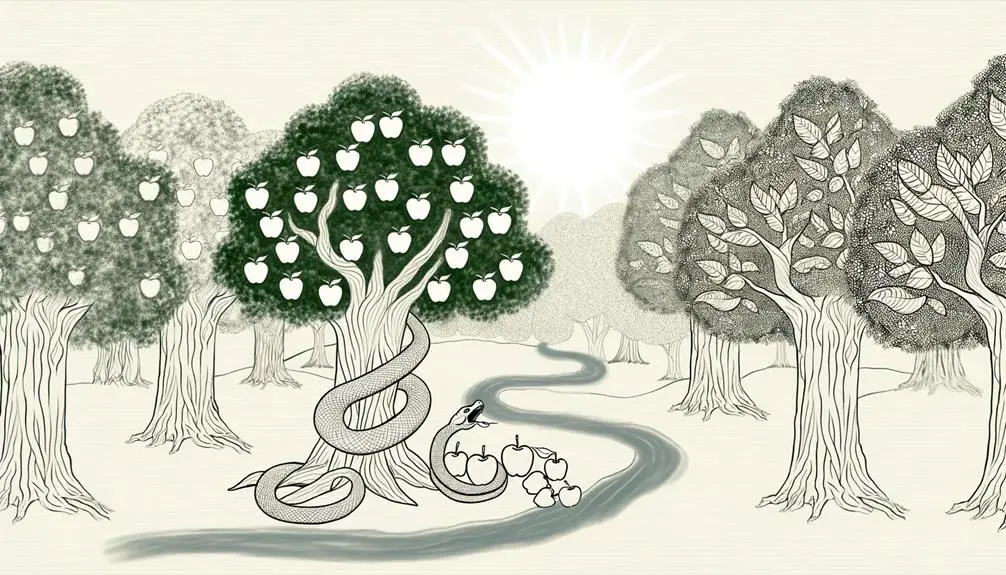
The Garden of Eden brims with symbolism, offering you profound insights into the human condition and divine expectations. Eden's geography itself, described as a lush garden at the world's center, symbolizes a point of divine-human encounter where heaven touches earth. This sacred space, surrounded by four rivers, underscores a theme of abundance and the nourishment of all life, pointing towards God's provision and care.
The flora within Eden carries deep symbolic meanings. Each plant and tree isn't just a part of the landscape but a reflection of spiritual truths. For instance, the Tree of Life represents eternal life and continuous growth in divine grace, while the various fruit trees suggest the richness of God's generosity and the variety of His gifts to humanity.
Here's a brief overview of key symbolic elements in Eden:
Symbol |
Representation |
Spiritual Insight |
|---|---|---|
Rivers |
Life's sustenance and purity |
Divine provision and purification |
Tree of Life |
Eternal spiritual growth |
Unending relationship with God |
Fruit trees |
Diversity of divine gifts |
Abundance and generosity of God |
Understanding these symbols helps you grasp the intended harmony between creation and creator, a harmony meant to guide your spiritual journey.
The Role of Temptation
Within Eden's narrative, temptation serves as a pivotal test of obedience and faith, highlighting humanity's free will and the consequences of its exercise. You, as a part of this humanity, are continuously faced with choices that test your fortitude and moral compass. The Genesis account isn't just a tale from the past; it mirrors the daily battles you encounter – the battle between short-term gratification and long-term wellbeing.
Temptation's universality is evident as everyone, regardless of time or place, encounters moments where they must choose between ease and principle. The story of Adam and Eve isn't merely about the fall of man, but also about the inherent challenge of resisting allure. It underscores a profound truth about human nature: you are inherently free to make your choices, yet not free from the consequences of these choices.
Understanding this, the importance of resisting temptation becomes clear. It isn't just about avoiding wrongdoing, but about cultivating a character that holds steadfast to values despite the appealing prospects of immediate reward. The narrative of Eden teaches you that every decision is significant and that your moral integrity is defined by your ability to resist the seductive, often easier paths in life.
Moral Lessons Learned
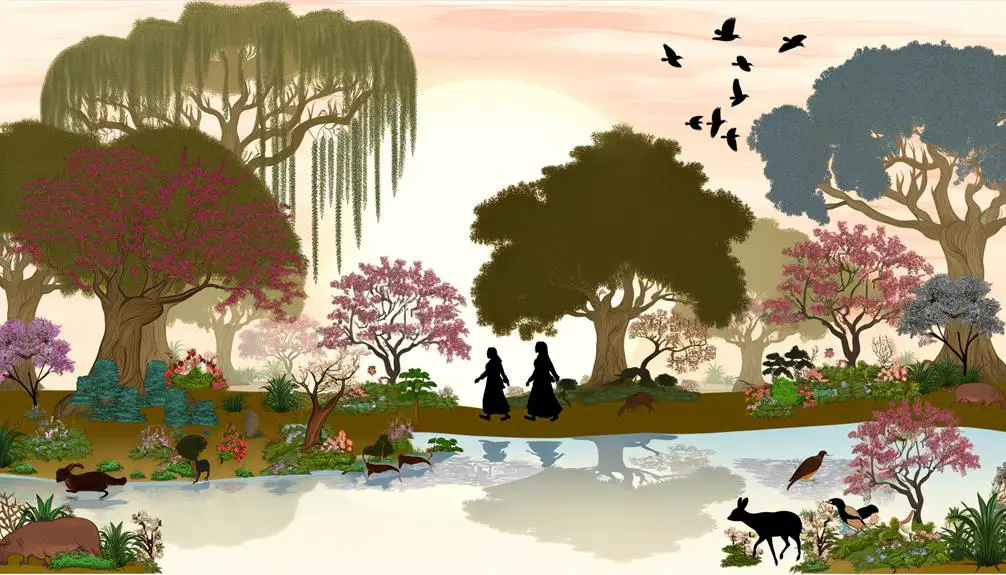
Often, the moral lessons from the Bible's creation stories guide you in understanding how your choices shape your spiritual and moral landscape. These narratives are not just ancient texts but frameworks setting forth divine responsibility and ethical paradigms that continue to resonate today. When you explore the story of Adam and Eve, you see a clear depiction of moral accountability. Their choices, influenced by temptation, not only affected their personal lives but also set a course for humanity. This teaches you the profound impact of individual actions on broader ethical and spiritual domains.
In these stories, divine responsibility is intertwined with human freedom, highlighting a balance of power and moral duty. As a steward of creation, you're reminded of your duty to uphold and respect the world around you. This stewardship is a critical component of ethical living, reflecting a deep respect for divine creation.
Moreover, the creation narratives establish foundational ethical paradigms by emphasizing the virtues of obedience, humility, and reverence. These virtues guide you in making decisions that align with a higher moral standard, shaping not just your actions but your character. Understanding these stories in a modern context encourages you to reflect on how you embody these timeless principles in everyday life.
Cultural Impact and Legacy
Across cultures and centuries, Bible creation stories have profoundly shaped societal values and norms, influencing how you perceive and interact with the world. These narratives are not merely ancient texts, but they continue to resonate, informing contemporary views on life, ethics, and the universe. The impact of these stories is multifaceted, deeply woven into the fabric of human history and daily life.
Consider the following elements that illustrate their broad legacy:
- Artistic interpretations: From Renaissance paintings to modern digital art, the visualization of Genesis has inspired countless artists, infusing cultural heritage with biblical motifs that encourage both religious reflection and aesthetic appreciation.
- Educational curriculum: In many societies, creation stories form a fundamental part of religious education, shaping the moral and ethical framework within which you learn other subjects.
- Legal and political systems: Many legal principles and political ideologies have been influenced by the ethical and moral lessons derived from these creation narratives, guiding governance and societal norms.
- Interfaith dialogue: These stories provide common ground for discussions among different religious groups, fostering mutual respect and understanding.
Through these channels, the creation stories of the Bible continue to mold the spiritual, intellectual, and cultural landscapes of societies worldwide.
Frequently Asked Questions
How Do Creation Stories Vary Across Different Cultures?
Imagine the tapestry of human belief: creation stories vary widely, reflecting cultural symbolism and mythological parallels that shape societies. You'll find each narrative rich with symbols, differing greatly to fit their cultural context.
What Scientific Theories Challenge Biblical Creation Stories?
You'll find that evolutionary biology and the Big Bang theory challenge traditional creation views by proposing natural, scientifically observable processes for the origins of life and the universe, respectively.
Are There Feminist Interpretations of Adam and Eve's Story?
Yes, feminist interpretations of Adam and Eve's story focus on Eve's agency and the gender dynamics, examining how traditional readings might reinforce patriarchal structures and exploring pathways for more equitable interpretations.
How Has the Story of Eden Influenced Modern Law?
How have moral foundations shaped laws? The story of Eden has deeply influenced legal precedents by embedding concepts of right and wrong, which you can see reflected in various modern legal systems.
What Are the Environmental Implications of the Creation Story?
You're exploring how beliefs in ecological stewardship and divine dominion shape environmental ethics. Analyzing these concepts can reveal how faith-based values influence actions towards conserving or exploiting natural resources in contemporary society.


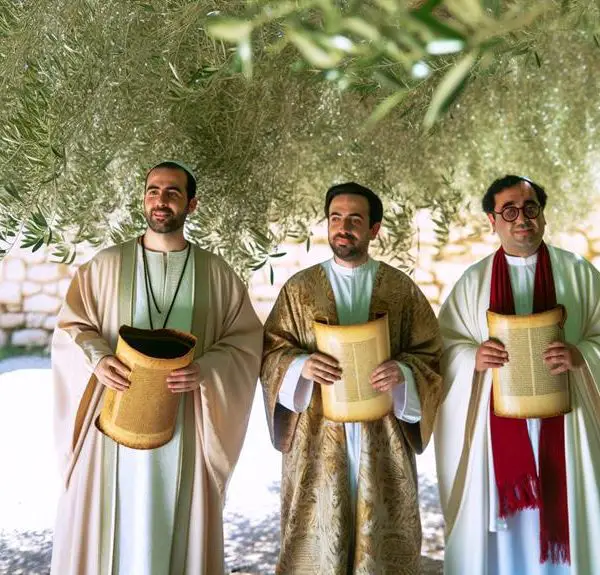
Sign up